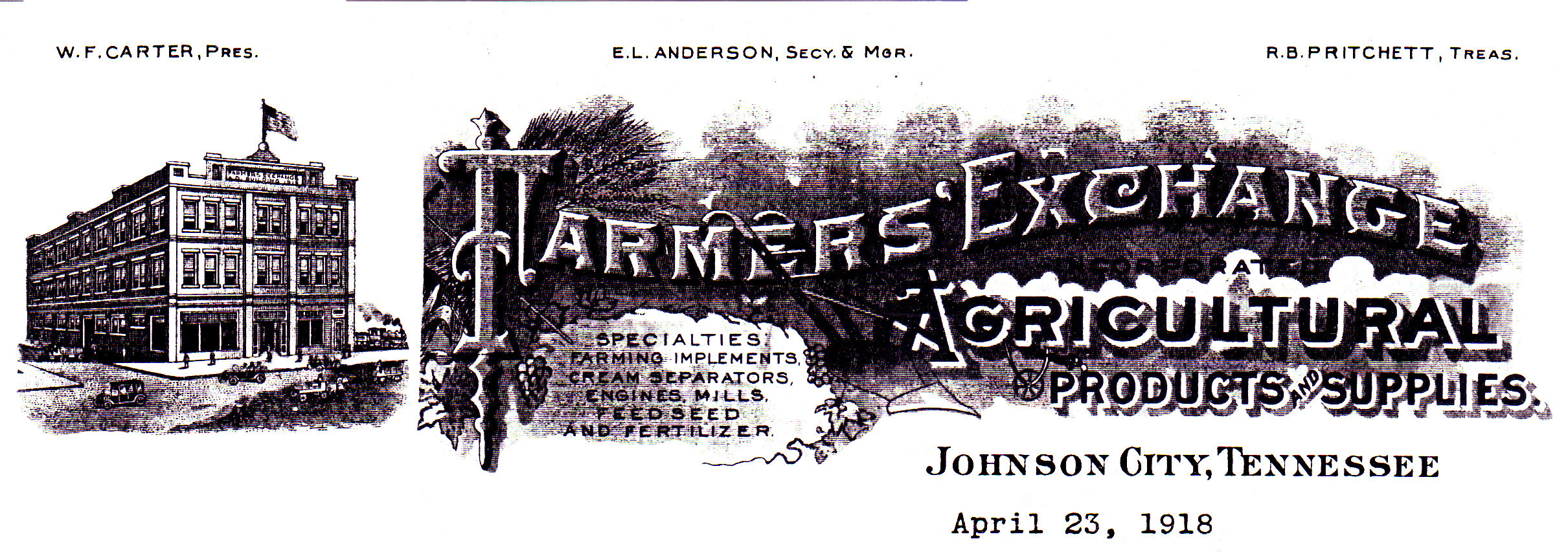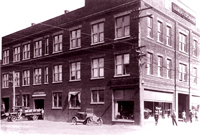I love a good mystery, especially when it concerns Johnson City’s history. Earl Buchanan sent me a very interesting advertisement, in the form of a letter, dated April 23, 1918, of the Farmers’ Exchange. The business sold an extensive assortment of agricultural supplies: “wagons, plows, mowers, rakes, harrows, mills, drills, gasoline engines, silage cutters, seed cleaners and other farm items.” While the ad contained no street address, the letterhead showed a small photo of the exchange building, which slightly resembled the Arcade building.
The letter was dated five years before the Arcade was constructed in 1923, ruling out that possibility. Where then was this large business of yesteryear located? The depiction showed a road flanking the left side of the building and a train on the right, billowing black smoke from its stack as it chugged along.


After some research, I determined the address of the Farmers’ Exchange to be at 106-110 West Market Street, in close proximity of the future Arcade Building. The London-Kirkpatrick Hardware occupied the site in 1928, becoming known two years later as London Hardware Company. The road in question was Commerce Street and the train was leaving the Southern Railway Depot, suggesting that the exchange building was built before the Taylor Brothers Building next door.
The advertisement identified the officers of the business as W.F. Carter (president), E.L. Anderson (secretary and manager) and R.S. Pritchett (treasurer). The letter illustrates the strong male influence of the early 1900s, containing some unusual language: “We hereby extend to you a cordial invitation to our anniversary May 4, 1918.
“The enclosed button may be worth several dollars as there are five hundred duplicate numbers, and if you will find the fellow wearing the same number you have and bring him to our store, we will give each of you a silver dollar.” Another benefit of wearing the button was receiving an additional 5% of all cash sales. The letter cautioned the receiver not to lose it, lest both parties miss an opportunity to win a dollar coin.
Not to be completely excluded, the farmers’ wives were addressed in the letter in a rather impersonal manner: “For the convenience of our farm women and other visitors, we have just completed a Ladies Rest Room on the second floor of our building where we will be glad to have them leave their bundles, eat their lunch or rest while they wait for trains or friends. Bring the women along.”
The brochure announced some quality improvements made to their product line: “We no longer sell you pea hulls, sticks and trash in your millet, for we have installed a seed cleaning plant and all peas, millet, cane seed, buckwheat, etc. are put in first-class condition before we send them to the farm. We have a power sheller and can handle your corn in the ear. We will also make corn meal and chop for you while you wait.”
The ad concluded by promoting their Sharples Suction Feed Separators, which they proclaimed to be “the most perfect separator on the face of the earth.”
The exchange either closed or moved to another location sometime between 1918 and 1928. One has to wonder if they took the Ladies Rest Room with them when they closed.
